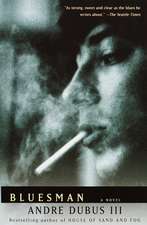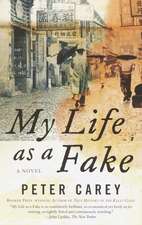Ghost
Autor Alan Lightmanen Limba Engleză Paperback – 30 sep 2008
Preț: 99.53 lei
Nou
Puncte Express: 149
Preț estimativ în valută:
19.04€ • 19.88$ • 15.76£
19.04€ • 19.88$ • 15.76£
Carte disponibilă
Livrare economică 15-29 martie
Preluare comenzi: 021 569.72.76
Specificații
ISBN-13: 9780375713439
ISBN-10: 0375713433
Pagini: 243
Dimensiuni: 133 x 202 x 14 mm
Greutate: 0.19 kg
Ediția:Reprint
Editura: Vintage Books USA
ISBN-10: 0375713433
Pagini: 243
Dimensiuni: 133 x 202 x 14 mm
Greutate: 0.19 kg
Ediția:Reprint
Editura: Vintage Books USA
Notă biografică
Alan Lightman was born in Memphis, Tennessee, and educated at Princeton and at the California Institute of Technology, where he received a Ph.D. in theoretical physics. An active research scientist in astronomy and physics for two decades, he has also taught both subjects on the faculties of Harvard and MIT. Lightman's novels include Einstein's Dreams, which was an international best seller; Good Benito; The Diagnosis, which was a finalist for the National Book Award; and Reunion. His essays have appeared in The New York Review of Books, The New York Times, Nature, The Atlantic Monthly, and The New Yorker, among other publications. He lives in Massachusetts, where he is adjunct professor of humanities at MIT.
Extras
I saw something.
I saw something out of the corner of my eye.
It’s been a week, but I still have that awful image in my mind. It burns. I close my eyes, and I see it. I open my eyes, and I see it.
But . . . where are the words to describe it?
I feel nauseated. I stare at the glass of water on my desk, wanting to drink. I stare at the glass of water. The flat top of the liquid looks so strange to me now, a silver ellipse, quivering like my stomach, trembling with each tiny vibration—my nervous foot tapping on the wood floor, a voice in the next apartment, my breath.
I need to settle myself. I haven’t slept well for a week. In bed, I lie awake and think. My hands are shaking. I can barely write. Now I’m looking at my hands, wrinkled yellow skin, veins crossing and branching. I feel dizzy. I can’t look at my hands anymore. Where can I rest my eyes? I see a pencil, stubby and blunt like a dull knife.
How can something happen that isn’t possible? I don’t know. Black is white. White is black. Up is down, down is up. Perhaps I imagined it.
I think that I saw something impossible. Am I crazy? I’m not crazy. Let me calm myself and figure out how to say this. I’ll pick up the dull knife of a pencil and write.
For breakfast this morning, I had a fried egg and two slices of dry toast, like anyone else, what little of it I could keep down. Before that, I shaved. I dressed. What else can I say? Just at this moment, I’m sitting at my desk by the window. I can look outside and see the street in front of my apartment building, children kicking a red ball back and forth, houses, mailboxes, garbage cans, a glass bottle in the grass, a laundry line with damp clothes draped over it. Isn’t that just normal life? Or I could turn around in my chair and look at my room. I’ll do that. I see a bookshelf and books, some wedged in sideways. I see my bed, half covered with the quilt my ex-wife gave me. I see a standing brass lamp with a crooked linen lampshade. A box of crackers on the table, cracker crumbs. A glass of water on my desk, this pencil, this pad of paper.k
The Pythagorean theorem, I still know: The square of the hypotenuse equals the sum of something or other. It has to do with the sides of triangles. Would a crazy person at age forty-two be able to remember anything about the Pythagorean theorem?
I’m beginning to feel dizzy again. The nausea comes in heaving cartwheels. My hands. I can’t write. I should just breathe slowly. Breathe. Breathe.
Let me read what I’ve written. Okay. My eyesight is good. I mention eyesight because I think I should list all the relevant factors. You see something weird, and, of course, the first thing you question is your eyesight. Or your mind. I want to put down in writing what I can. I’ve tried to tell a few people, but I can’t find the words. Even now, I can’t find the words. Ellen suggested I write it down. I’m not sure what she thinks, whether she really believes me. We were having dinner at her favorite Indian restaurant, she flirting with the waiter as she always does, half trying to make me jealous and half just being herself, and she held my hand after I told her and said I should write it down.
Where was I? My eyesight. When I go to the optometrist for my biannual examination, I can read the bottom row of letters on the chart. As a child, I was always the first one to spot the school bus coming. I could see the tiny yellow speck in the distance, just the smallest glint of yellow. My friends thought that I was cheating, that what I really saw was the cloud of dust trailing the bus, but I saw the tiny yellow dot. I’ll admit that I’ve never needed such good eyesight for any practical purpose. My books have regular-size type. When I worked in the bank, the numbers were never so small, but I could have read them if they had been.
My hearing is also good. When I saw what I saw, I didn’t hear anything unusual. I have no recollection of any sound at all, aside from the ticking of the clock in Martin’s office.
And I don’t think I’m at all . . . how should I put it . . . suggestible. I believe that’s the word. Never in my life have I been suggestible. At a party years ago, a hypnotist tried to put me under and failed. He said I was not “suggestible,” and then he looked at me as if I were a man unable to fall in love. If I could travel back to that party years ago—I think I was in my mid-twenties—I would tell that guy and everyone else that I am happy not being suggestible. I prefer seeing the world as it is.
I feel slightly better. I managed a sip, and I am holding it down. Breathe.
Now my head is beginning to boil. And the cartwheels are flying again. I wish I hadn’t seen what I saw. I want the world to go back to where it was a week ago. The thing lasted only a few seconds. A few seconds. Why can’t those five seconds be smudged out and erased? What is five seconds in the space of a year, or even a day? I must have imagined it. I caught it only out of the corner of my eye. Just a brief hovering thing in the corner of my eye. What was it? Where are the words to say what it was? The thing looked so real, as real as my handwriting at this moment. Could I imagine something so real and so bizarre at the same time? I was feeling fine that day. I wasn’t having headaches or eye problems or strange thoughts. My mind was clear. That morning, I arrived at the mortuary at nine, as usual. I made some phone calls to locate a death certificate, I met with Martin, I helped a family pick out a casket. And then, in the late afternoon, in the slumber room, that’s when it happened.
I don’t believe in supernatural phenomena. I don’t believe in magic or hyperkinesis or spirits. When I was a child, my aunt told me that the seasons are needed for plants to grow, and that the sacred Spirit of All Living Things re-creates the seasons each year. With all due respect to my aunt, the seasons are caused by the tilt of the Earth. The Earth is just a big ball of dirt out there in space, and it happens to have a tilt to its axis. It’s a proven fact. Eons ago, some meteor hit the Earth by accident and cocked it over at an angle. In summer, the Earth’s axis points toward the sun, making us hotter. In winter, it points away from the sun, making us colder. What could be more logical? Cause and effect. No tilt, no seasons. It’s physics, or whatever. It’s like the Pythagorean theorem.
I’m exhausted.
What? What? How long did I nod off in my chair? I should look at my watch on the bureau, but what does it matter. Time has passed. The shadows have moved through the room. I’m just writing down everything that comes into my head. It’s something to do. I should go out for a walk, call Ellen, anything. Somewhere in my apartment there’s a novel I would finish if I could bring myself to read. It’s a novel by a Japanese writer about an umemployed man who sits at home all day and gets pornographic phone calls from strange women. It rained Friday. I came home from work, walked next door to the diner, and asked Marie to bring me some hot tea. Then I just sat at the window of my apartment and watched the sheets of rain falling outside. I didn’t go out for supper. It was raining too hard, considering that my galoshes have holes in them. Some of the tenants ventured out and returned laughing and sneezing and dripping pools of water by the front door. Marie, bless her heart, stayed late to make sandwiches for us housebound tenants. She personally brought over the food and delivered it to each person’s apartment, humming some show tune.
Marie often stays late at the diner or here in the apartments, even though she has her own family to take care of—a bedridden husband with multiple sclerosis and a grown son who gambles away all his money and lives at home. Occasionally, her son comes here, knocking on doors and asking for a loan. Just a one-week loan, he says. He has a sad face, and he always tells a heartbreaking story. Then Marie chases him off, he begins screaming at her, she screams back at him. From time to time, I do give him a little money.
Voices trickle in from the hall. Henry. George. Raymond. Someone else I can’t place, a new tenant. Most are middle-aged men like myself, single, living on moderate incomes. A few younger guys, trying to save. A few women and married couples. Although I’ve been here for several years, I still don’t know any of the other tenants well, certainly not as friends. We see one another at breakfast. We pass in the hall, or at the laundry in the basement. I’ve come to realize that I don’t want any friends here. I’ve had friends in other places and at other times of my life. To be honest, I don’t mind being alone. I read. Something changed after Bethany left me. I wanted to be alone. I hate living alone, but I want it at the same time.
I’m just writing. It’s something to do. I don’t even know if everything I write is true.
I’ve got to hold my burning head very still. Or I should lie down. Perhaps Marie can get me an icepack for my head. But I shouldn’t burden her with another task on her day off. Today she should be home with her family, or at church. Early this morning, she came into the lobby downstairs wearing a beautiful dress and pink high-heeled shoes and said that she was on her way to church but just wanted to stop by and “tidy a bit.” That was hours ago, and she hasn’t left. I can hear her singing in the hall. Marie truly seems to enjoy the place, all the more so because it used to be a rambling old house, with a sitting room downstairs, and she says it has a “coziness” to it.
Marie believes in the supernatural. When I told her what I saw, she replied that she wasn’t surprised, with my working in a mortuary. She said that spirits remain in the body for three days after mortal death. And she spoke the word mortal with an emphasis. Marie believes that she has received certain signals from her dead mother, such as odd chirpings of birds and doors suddenly opening by themselves. She reads the astrologer’s report in the newspaper.
Logic, I should say to Marie. But I don’t want to upset her. Marie has been extremely kind to me, and she earns very little for her long hours. But I want her to understand. Cause and effect. The tilt of the Earth. Am I repeating myself? I want to say to her: Logic is what holds it all together. Without logic, anything could happen. People could turn into frogs. The Moon could suddenly fly off into space. If one illogical thing happens, then a million illogical things can happen. The entire world might come apart piece by piece, like when you pull a stray thread on the sleeve of your jacket. The fabric starts to unravel. And once it starts to unravel, nothing can stop it. First the sleeve comes undone, then the shoulder, then the lapel.
Marie has been asking questions about what I saw at the mortuary. Yesterday morning at the diner, she came over and sat next to me and she said, “You’ve been chosen.” I realize now that I shouldn’t have told her anything. “I imagined it,” I said to her. Maybe I did imagine it. “No, you didn’t,” she said quietly. Then she asked me to take her to the mortuary, to the slumber room. I shouldn’t have told her anything.
I feel ill. I’m not sure anymore what I know and don’t know. It’s Sunday. Yesterday was Saturday. I should go out for my walk by the lake. I should visit Ellen, do something. But my hands are shaking. I’m going to lie down.
From the Hardcover edition.
I saw something out of the corner of my eye.
It’s been a week, but I still have that awful image in my mind. It burns. I close my eyes, and I see it. I open my eyes, and I see it.
But . . . where are the words to describe it?
I feel nauseated. I stare at the glass of water on my desk, wanting to drink. I stare at the glass of water. The flat top of the liquid looks so strange to me now, a silver ellipse, quivering like my stomach, trembling with each tiny vibration—my nervous foot tapping on the wood floor, a voice in the next apartment, my breath.
I need to settle myself. I haven’t slept well for a week. In bed, I lie awake and think. My hands are shaking. I can barely write. Now I’m looking at my hands, wrinkled yellow skin, veins crossing and branching. I feel dizzy. I can’t look at my hands anymore. Where can I rest my eyes? I see a pencil, stubby and blunt like a dull knife.
How can something happen that isn’t possible? I don’t know. Black is white. White is black. Up is down, down is up. Perhaps I imagined it.
I think that I saw something impossible. Am I crazy? I’m not crazy. Let me calm myself and figure out how to say this. I’ll pick up the dull knife of a pencil and write.
For breakfast this morning, I had a fried egg and two slices of dry toast, like anyone else, what little of it I could keep down. Before that, I shaved. I dressed. What else can I say? Just at this moment, I’m sitting at my desk by the window. I can look outside and see the street in front of my apartment building, children kicking a red ball back and forth, houses, mailboxes, garbage cans, a glass bottle in the grass, a laundry line with damp clothes draped over it. Isn’t that just normal life? Or I could turn around in my chair and look at my room. I’ll do that. I see a bookshelf and books, some wedged in sideways. I see my bed, half covered with the quilt my ex-wife gave me. I see a standing brass lamp with a crooked linen lampshade. A box of crackers on the table, cracker crumbs. A glass of water on my desk, this pencil, this pad of paper.k
The Pythagorean theorem, I still know: The square of the hypotenuse equals the sum of something or other. It has to do with the sides of triangles. Would a crazy person at age forty-two be able to remember anything about the Pythagorean theorem?
I’m beginning to feel dizzy again. The nausea comes in heaving cartwheels. My hands. I can’t write. I should just breathe slowly. Breathe. Breathe.
Let me read what I’ve written. Okay. My eyesight is good. I mention eyesight because I think I should list all the relevant factors. You see something weird, and, of course, the first thing you question is your eyesight. Or your mind. I want to put down in writing what I can. I’ve tried to tell a few people, but I can’t find the words. Even now, I can’t find the words. Ellen suggested I write it down. I’m not sure what she thinks, whether she really believes me. We were having dinner at her favorite Indian restaurant, she flirting with the waiter as she always does, half trying to make me jealous and half just being herself, and she held my hand after I told her and said I should write it down.
Where was I? My eyesight. When I go to the optometrist for my biannual examination, I can read the bottom row of letters on the chart. As a child, I was always the first one to spot the school bus coming. I could see the tiny yellow speck in the distance, just the smallest glint of yellow. My friends thought that I was cheating, that what I really saw was the cloud of dust trailing the bus, but I saw the tiny yellow dot. I’ll admit that I’ve never needed such good eyesight for any practical purpose. My books have regular-size type. When I worked in the bank, the numbers were never so small, but I could have read them if they had been.
My hearing is also good. When I saw what I saw, I didn’t hear anything unusual. I have no recollection of any sound at all, aside from the ticking of the clock in Martin’s office.
And I don’t think I’m at all . . . how should I put it . . . suggestible. I believe that’s the word. Never in my life have I been suggestible. At a party years ago, a hypnotist tried to put me under and failed. He said I was not “suggestible,” and then he looked at me as if I were a man unable to fall in love. If I could travel back to that party years ago—I think I was in my mid-twenties—I would tell that guy and everyone else that I am happy not being suggestible. I prefer seeing the world as it is.
I feel slightly better. I managed a sip, and I am holding it down. Breathe.
Now my head is beginning to boil. And the cartwheels are flying again. I wish I hadn’t seen what I saw. I want the world to go back to where it was a week ago. The thing lasted only a few seconds. A few seconds. Why can’t those five seconds be smudged out and erased? What is five seconds in the space of a year, or even a day? I must have imagined it. I caught it only out of the corner of my eye. Just a brief hovering thing in the corner of my eye. What was it? Where are the words to say what it was? The thing looked so real, as real as my handwriting at this moment. Could I imagine something so real and so bizarre at the same time? I was feeling fine that day. I wasn’t having headaches or eye problems or strange thoughts. My mind was clear. That morning, I arrived at the mortuary at nine, as usual. I made some phone calls to locate a death certificate, I met with Martin, I helped a family pick out a casket. And then, in the late afternoon, in the slumber room, that’s when it happened.
I don’t believe in supernatural phenomena. I don’t believe in magic or hyperkinesis or spirits. When I was a child, my aunt told me that the seasons are needed for plants to grow, and that the sacred Spirit of All Living Things re-creates the seasons each year. With all due respect to my aunt, the seasons are caused by the tilt of the Earth. The Earth is just a big ball of dirt out there in space, and it happens to have a tilt to its axis. It’s a proven fact. Eons ago, some meteor hit the Earth by accident and cocked it over at an angle. In summer, the Earth’s axis points toward the sun, making us hotter. In winter, it points away from the sun, making us colder. What could be more logical? Cause and effect. No tilt, no seasons. It’s physics, or whatever. It’s like the Pythagorean theorem.
I’m exhausted.
What? What? How long did I nod off in my chair? I should look at my watch on the bureau, but what does it matter. Time has passed. The shadows have moved through the room. I’m just writing down everything that comes into my head. It’s something to do. I should go out for a walk, call Ellen, anything. Somewhere in my apartment there’s a novel I would finish if I could bring myself to read. It’s a novel by a Japanese writer about an umemployed man who sits at home all day and gets pornographic phone calls from strange women. It rained Friday. I came home from work, walked next door to the diner, and asked Marie to bring me some hot tea. Then I just sat at the window of my apartment and watched the sheets of rain falling outside. I didn’t go out for supper. It was raining too hard, considering that my galoshes have holes in them. Some of the tenants ventured out and returned laughing and sneezing and dripping pools of water by the front door. Marie, bless her heart, stayed late to make sandwiches for us housebound tenants. She personally brought over the food and delivered it to each person’s apartment, humming some show tune.
Marie often stays late at the diner or here in the apartments, even though she has her own family to take care of—a bedridden husband with multiple sclerosis and a grown son who gambles away all his money and lives at home. Occasionally, her son comes here, knocking on doors and asking for a loan. Just a one-week loan, he says. He has a sad face, and he always tells a heartbreaking story. Then Marie chases him off, he begins screaming at her, she screams back at him. From time to time, I do give him a little money.
Voices trickle in from the hall. Henry. George. Raymond. Someone else I can’t place, a new tenant. Most are middle-aged men like myself, single, living on moderate incomes. A few younger guys, trying to save. A few women and married couples. Although I’ve been here for several years, I still don’t know any of the other tenants well, certainly not as friends. We see one another at breakfast. We pass in the hall, or at the laundry in the basement. I’ve come to realize that I don’t want any friends here. I’ve had friends in other places and at other times of my life. To be honest, I don’t mind being alone. I read. Something changed after Bethany left me. I wanted to be alone. I hate living alone, but I want it at the same time.
I’m just writing. It’s something to do. I don’t even know if everything I write is true.
I’ve got to hold my burning head very still. Or I should lie down. Perhaps Marie can get me an icepack for my head. But I shouldn’t burden her with another task on her day off. Today she should be home with her family, or at church. Early this morning, she came into the lobby downstairs wearing a beautiful dress and pink high-heeled shoes and said that she was on her way to church but just wanted to stop by and “tidy a bit.” That was hours ago, and she hasn’t left. I can hear her singing in the hall. Marie truly seems to enjoy the place, all the more so because it used to be a rambling old house, with a sitting room downstairs, and she says it has a “coziness” to it.
Marie believes in the supernatural. When I told her what I saw, she replied that she wasn’t surprised, with my working in a mortuary. She said that spirits remain in the body for three days after mortal death. And she spoke the word mortal with an emphasis. Marie believes that she has received certain signals from her dead mother, such as odd chirpings of birds and doors suddenly opening by themselves. She reads the astrologer’s report in the newspaper.
Logic, I should say to Marie. But I don’t want to upset her. Marie has been extremely kind to me, and she earns very little for her long hours. But I want her to understand. Cause and effect. The tilt of the Earth. Am I repeating myself? I want to say to her: Logic is what holds it all together. Without logic, anything could happen. People could turn into frogs. The Moon could suddenly fly off into space. If one illogical thing happens, then a million illogical things can happen. The entire world might come apart piece by piece, like when you pull a stray thread on the sleeve of your jacket. The fabric starts to unravel. And once it starts to unravel, nothing can stop it. First the sleeve comes undone, then the shoulder, then the lapel.
Marie has been asking questions about what I saw at the mortuary. Yesterday morning at the diner, she came over and sat next to me and she said, “You’ve been chosen.” I realize now that I shouldn’t have told her anything. “I imagined it,” I said to her. Maybe I did imagine it. “No, you didn’t,” she said quietly. Then she asked me to take her to the mortuary, to the slumber room. I shouldn’t have told her anything.
I feel ill. I’m not sure anymore what I know and don’t know. It’s Sunday. Yesterday was Saturday. I should go out for my walk by the lake. I should visit Ellen, do something. But my hands are shaking. I’m going to lie down.
From the Hardcover edition.
Recenzii
"Elegantly provocative. . . . Fine and deeply thoughtful fiction."—Los Angeles Times"Supple. . . . Engaging. . . . A substantial achievement."—The New York Times Book Review“Fascinating. . . . Brilliant. . . . Explores the liminal state between knowledge and belief.”—The Washington Post Book World “Powerful. . . . Looks at the spirit that moves us.”—Boston Globe
Descriere
Embarking on a provocative exploration of the delicate divide between the physical world and the spiritual world, between skepticism and faith, this novel from highly acclaimed author Lightman investigates timeless questions that continue to challenge contemporary society.










